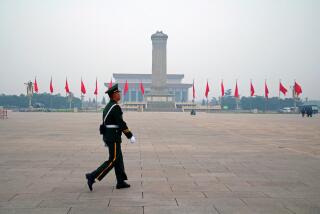Video emerges of Chinese man abducted in Pakistan
- Share via
Reporting from Beijing — More than a year after the kidnapping of a Chinese cyclist, video has surfaced of Hong Xudong in confinement, apparently inside a cave in northwest Pakistan.
The leader of a Taliban splinter group, Shehryar Mehsud, has claimed responsibility, according to an online posting by an acquaintance of Hong. China’s state media have reported that Hong’s family members traveled to Beijing last year to seek officials’ help in securing his release.
At a briefing last week, Chinese Foreign Ministry spokeswoman Hua Chunying said that the government is in the early stages of investigation.
“We, too, have seen the news report about the kidnapping. And we’re now trying our best to confirm the veracity of the report,” Hua said.
In the video, handed over to The Associated Press by a member of another Taliban splinter group, Hong, in his 20s, pale, with overgrown hair touching his shoulders, asked his government to meet his captors’ demand for unspecified ransom.
Hong, who called himself “an IT migrant worker” from southern Chinese province of Hubei, quit his job in Beijing and left from Xian in western China in August 2013 on his bicycle. He pedaled to Tibet and by mid-March had reached Nepal.
Later, he headed to India, and around April 2014, he rode on a cross-border bus into Lahore, Pakistan.
“The Pakistanis are very hospitable toward the Chinese. No security check for me. I was only asked if I brought any alcohol with me,” Hong blogged.
Hong disappeared after staying in an Islamabad hotel. Pakistani police reportedly recovered his passport, bicycle and other belongings near the Afghan border.
In 2008, two engineers for a Chinese state-owned telecommunication equipment company were abducted by the Taliban in Pakistan. One of them managed to escape; the other was rescued after six months of joint efforts by Chinese and Pakistani authorities, according to China’s state media report.
“Pakistan has been in a serious crisis of terrorism,” said Rohan Gunaratna, a terrorism expert at Nanyang Technological University in Singapore. “It is the practice of Chinese security apparatus to work quietly and behind the scenes.”
Law is a special correspondent. Tommy Yang of The Times’ Beijing bureau and special correspondent Zulfiqar Ali in Peshawar, Pakistan, contributed to this report.
More to Read
Sign up for Essential California
The most important California stories and recommendations in your inbox every morning.
You may occasionally receive promotional content from the Los Angeles Times.













